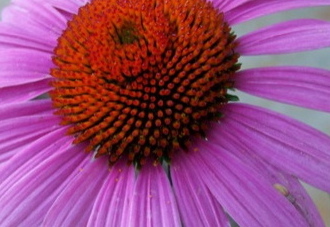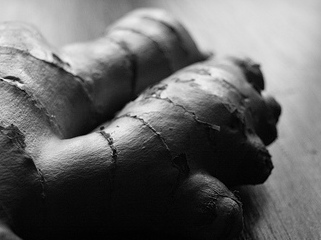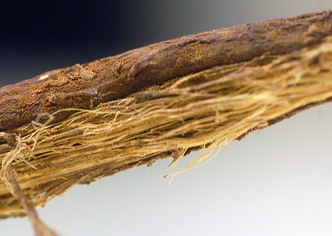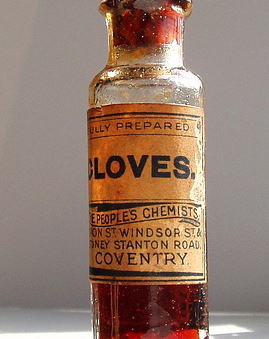14 Natural Items for Your Alternative First Aid Kit
1. Echinacea (Echinacea purpurea)
This is top of the list because it’s just so damn useful. Echinacea helps support a healthy immune system. It also has antibacterial and antibiotic properties. If you start to feel something coming on, dosing yourself with a tincture of echinacea is a good way to help you stay healthy. At the very least, you won’t stay sick as long. It works well in conjunction with vitamin C.

Echinacea. Photo by lemonjenny
2. Goldenseal (Hydrastis Canadensis)
A powerful antibacterial, antibiotic, and antiparasitical potion.Goldenseal in its powdered form can be applied to open cuts to help them from getting infected. On the road it’s best used in a tincture if you get something funky from dirty water or street food. It can zap parasites and help to keep your intestinal tract free of them. Coupled with echinacea, it can take on more serious colds like strep throat when you are in a pinch.
3. Cramp Bark (Viburnum opulus)
Few things can kill a travel buzz like bad menstrual cramps. Cramp bark is a herbal alternative to over-the-counter painkillers. Cramp bark goes farther than just dulling the pain, it also helps to chill out the muscles that are causing the pain, thereby stopping the cramps. Take it in a tincture.
4. All Heal (Prunella vulgaris)
All-Heal, Self- Heal and Heal-All are all common names of a plant which has many uses: antibiotic, antiseptic, astringent. The primary use for travelers is as a salve or ointment. All-Heal salve is used in all the ways you would use Neosporin to help keep cuts clean and heal faster. It has antibiotic properties to help prevent infection and heals cuts with remarkable speed. Look for an All-Heal salve or ointment sold under many brands.

Ginger root. Photo by Crystl
5. Ginger (Zingiber officinale)or Peppermint Tea
Stomach troubles are one of the most common issues among travelers. Bothginger and peppermint are adept at soothing stomach upsets. They work with remarkable speed and gingerespecially has properties which actually aid your body in digesting. Ginger tea or pastilles are good for combating motion sickness and nausea.
6. Arnica (Arnica montana)
Arnica is commonly found in two forms, either as a gel( look for Boiron brand) or in homeopathic pellets. The gel, when used externally, is wonderful for removing bruises, bringing down puffiness or swelling, and easing deep aches. Internally, it can be used to alleviate headaches and help your body recover from trauma, such as when you tip over your moped.
7. Tea Tree Oil (Melaleuca alternifolia)
Native to Australia, the tea tree plant produces a powerful astringent oil. Strong smelling tea tree oil should always be diluted in water, as a few drops goes a long way. It can be used to cleanse scratches and abrasions, to clean the face and in a neti pot to clean the sinuses. Drop a few drops in water and swish in your mouth like mouthwash if you are out of toothpaste. It can also reduce skin irritations, especially of the fungal variety.

Licorice Root. Photo by aSIMULAtor
8. Licorice Tea
Licorice tastes delicious, is naturally sweet, and is super if you have a sore throat. It has mucilaginous properties that help keep dry throats from being scratchy, especially useful when traveling through smog and pollution. The tea can also be used to help get your digestion moving if you have cured the runs a little too well or eaten one too many fried morsels.
9. Emer-gen-C
While not a herb or homeopathic, Emer-gen-C is one of God’s gifts to travelers. Found in most US natural health and vitamin stores, it is a powdered, super-concentrated dose of Vitamin C that helps prevent you picking up whatever it was that guy next to you on the plane had. Better yet, Emer-gen-C is packed with electrolytes, which your body loses steadily when you sweat, especially in hot places. Pouring a packet into you water bottle is an easy way to replenish your body’s reserves of these essential nutrients and stave off dehydration. As a bonus, it also comes in many flavors, which can be nice when your water tastes like warm plastic. I recommend the “tropical” variety.
10. Bach’s Rescue Remedy
Alright, so nobody really knows how flower essences work. It may all be in your head, but they are so effective, who cares? Bach’s, a British company, sells their popular blend of five flower essences called Rescue Remedy throughout the UK, parts of Europe, and specialty health stores in the US. Rescue Remedy is useful for just about everything. It helps you stay calm when dealing with long lines, customs officials, touts and layovers. It can ease the shock of transitions into a new culture, or back into your home one. They now have Rescue Remedy Sleep and Rescue Remedy Energy, which really should be called Rescue Remedy Travel because its been formulated to provide “relief for emotional fatigue brought on by stress or strain during times of personal difficulty”.
11. Neem (Azadirachta indica) Powder
Considered a sacred plant in India, neem has dozens of uses, from acting as a natural air conditioner when placed in gardens to helping to keep your gums healthy. Neem powder may be difficult to find outside the subcontinent, but it’s worth a look at your local Asian grocery store if you can’t find it elsewhere. For travelers, neem is great for keeping those terrible pests of the night away. A natural insect repellent, you can sleep a little easier after sprinkling your sheets with the powder. It has a clean medicinal smell, though the odor can also deter some people from using it. Sprinkle some in your shoes to help ward off foot fungus as well.

Clove Oil. Photo by amandabhslater
12. Clove Oil
This little spice packs a mighty aromatic punch, but clove oil’s real use is as a numbing agent. In dental emergencies, diluted clove oil can numb the gums, mouth, and teeth. It also may help keep tooth infections from spreading, as clove has anti-bacterial properties. Though its primary use is dental, clove oil can numb the skin as well and its aromatic properties can be reviving and motivating. Always dilute clove oil in water prior to application, and although it can be used in the mouth it should not be ingested.
13. Lavender (Lavandula angustifolia) Oil
Have a headache, feeling low, need to chill out? Getting tired of the smell of exhaust/open sewer/ smoke/ fish? Lavender oil is easy to throw in your bag, and you can rub it on your temple, the pressure points on the inside of your wrists, and under your nose. Aromatherapy is a simple and effective way to help you maintain emotional balance while on the move. As a bonus, it can also deter someinsects from biting you, though I wouldn’t substitute it for a mosquito repellent in a malarialarea. If nothing else, you can always use it to disguise the fact that you haven’t been near a shower in over a week. Just remember never to ingest lavender oil: it is toxic in such a concentrated form.
14. Aloe Vera Gel
Getting sunburned sucks, especially when you have to carry a backpack on those peeling red shoulders. Rub some aloe vera on: it promotes healing and relieves that burning sensation. Your sunburn will ease into a tan faster.
The key to using herbal and alternative medicine while traveling is to be prepared. If you normally use a one ounce tincture bottle at home, bring two or four. Remember that some things are hard to find when you’re far from home. Knowing the Latin names of certain plants is a good practice to get into.

Comments
Post a Comment